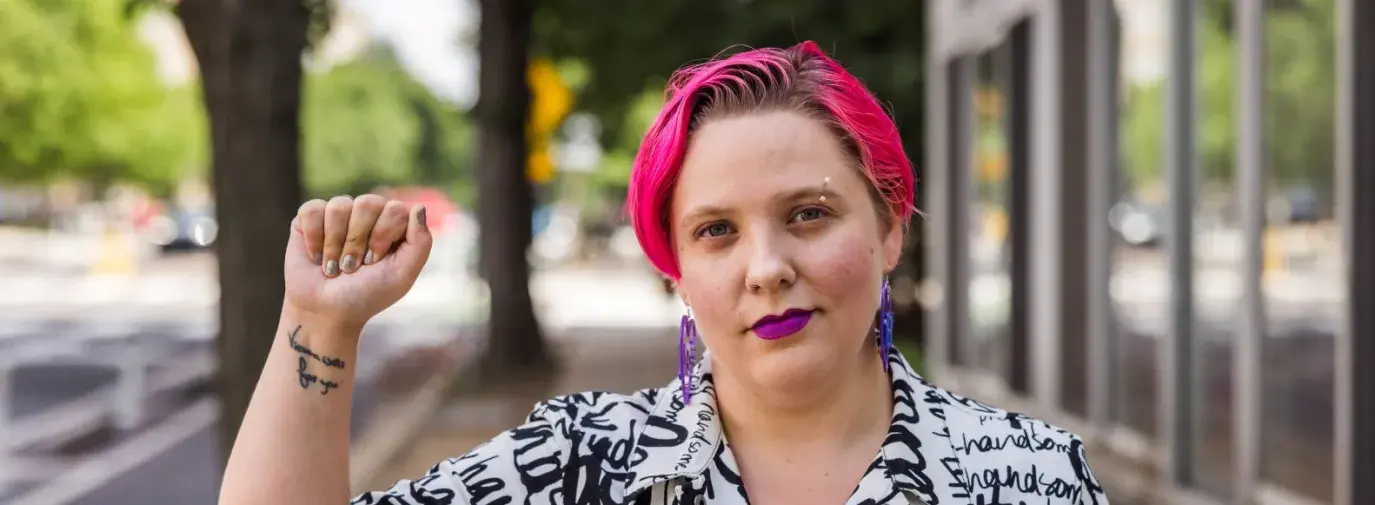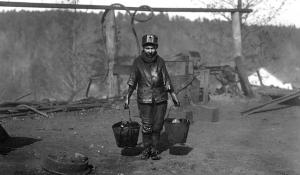
For nothing is fixed,
forever, forever, forever,
it is not fixed;
the earth is always shifting,
the light is always changing,
the sea does not cease to
grind down rock.
Being an activist is caring. It is disrupting and organizing. It is building and healing. Being an activist means understanding how deep bias and privilege are woven into our systems of government and culture. It requires our awareness of the impact we have on our neighbors, our planet, every living creature, regardless of our intentions. It is a weight on the mind, body, and spirit, and it is necessary.
One of the most defining moments of this year for me was the death of non-binary student Nex Benedict, caused directly by the war on transgender people’s bodies and wellbeing. It was a direct act of hatred toward the most vulnerable in my community. I felt lost, overwhelmed, and mournful. But there was more to do, there was always more to do for the innocent lives being regulated by archaic laws, blown apart by global conflict and genocide, gnawed at by hunger when forgotten.
It is fertile ground for burnout to take root.
Although the World Health Organization defines burnout as a “chronic workplace stress,” Emily and Amelia Nagosky, authors of “Burnout,” offer a simpler and more effective definition: “being overwhelmed and drained by everything you have to do and, yet, somehow still feeling worried you’re not doing enough.”
Advocacy burnout comes from a well-intentioned place, but the result is still the same: a mind and body dangerously depleted of the energy needed to care for others, not to mention oneself.
Fighting for my family—remarkable trans youth, powerful trans women and men, genderqueer and non-binary baddies, two-spirit forebears—is the matter closest to me. I wanted to refocus where my energy is best spent, accept my own limits, and trust in my comrades.
In 2024, I became a mentor with the Trans Mentor Project by the Sam & Devorah Foundation for Trans Youth. Through this program, trans adults are paired with trans minors and young adults to provide a safe space, connection, and empowerment.
As the Fred Rogers quote goes, “look for the helpers.” Being a mentor for trans youth is the perfect way to give back to my community and a source of great joy, without exhausting my energy, financial reality, or purpose. By respecting and honoring my own boundaries, I am also able to take the time to check in on my community and provide support.
Generations do not cease to be born,
and we are responsible to them
because we are the only
witnesses they have.
A key lesson for me this year was expanding my care and advocacy to a global level, granting me the chance to see and feel the ache of other bodies even beyond my community.
Invisible borders, built on centuries of imperialism, cannot and must not hinder our advocacy branching outside of our own country.
In November, the UN Special Committee to Investigate Israeli Practices concluded “Israel’s methods of war [against Palestine] align with the characteristics of genocide.” They clarified: “This is not a temporary crisis; it is a lasting catastrophe for the people of Gaza,” in which clearing only half of the debris could take 45 years and some environmental damage may be irreversible.
It is something no one should abide by. Here in the U.S., we’ve seen similar devastation before: the Trail of Tears, America’s enslavement of Black people, the internment of Japanese Americans, and hundreds of thousands murdered by the US government’s disregard for Black, Brown, and queer bodies during the AIDS crisis.
I know how history views trans and queer bodies as unimportant and disposable. In his book “Queer Palestine and the Empire of Critique,” Sa’ed Atshan describes “pinkwashing,” in which governments use queer existence to justify genocide. As an example, Atshan refers to the tactic of painting the state of Israel as a “gay haven” while “eliding queer Palestinian agency,” which implies the “superior humanity” in one group over another.
Thousands of miles away, I refuse to stand by and watch intimate violence against marginalized bodies, against my own trans and queer brethren, simply because the West has allowed and contributed to it. There is safety and dignity in having one’s body valued, and with that comes a future of autonomy and sacredness for trans bodies, Palestinian bodies, and the body of our own planet.
The sea rises, the light fails,
lovers cling to each other,
and children cling to us.
Advocating for others, though, is predicated on advocating for yourself. You can’t pour from an empty cup, but neither can you pour from a battered and bruised cup, energy and compassion dripping through untreated cracks.
That is what I felt like before getting top surgery at the start of the year.
Every day that I woke up in a body I didn’t recognize, it was agony. To the point that even the mundane became a battle—walking my dog, getting dressed, seeing myself in the mirror before stepping into the shower. How could I help give voice to queer Palestinians, or be an asset to my own neighbors, if I was pouring all my energy into fighting my own hatred of my body?
I wanted to be a better version of myself, one who could be fully present in themselves and show up for those I cared about. So, I sat my wife down and said: “I need to get top surgery. I need it to survive. Our healthcare system is a mess, gender affirming care is being attacked on all sides, but I will figure it out.”
Getting top surgery was one of the easiest decisions I’ve ever made, second only to marrying my wife.
ow, I wake up and want to cry tears of joy when I see myself in the mirror. Finally feeling right in my body alleviated crushing stress and pain, which in turn allowed space to be more present for my wife, my friends, and my community, both locally and across the globe. It is something I can share with my mentees to more authentically help them navigate their own dysphoria and affirming needs. After years of internal strife, I loved myself and learned how to better love others.
The ecstasy of touching someone you love, nourishing your hunger, climbing a mountain to see our world from a different perspective, it is nearly overpowering when your body is safe, cared for, fought for. I believe this feeling is an inalienable human right—for everyone.
The moment we cease to hold each other,
the moment we break faith with one another,
the sea engulfs us and the light goes out.
—James Baldwin, “For Nothing Is Fixed”







